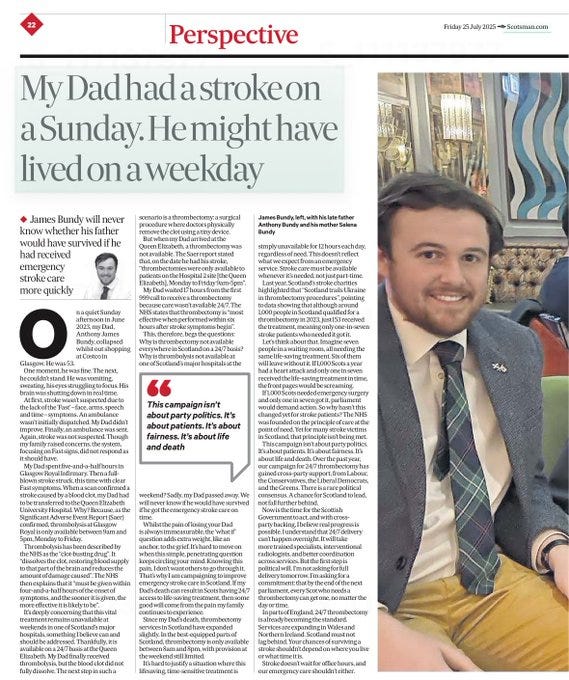Grieving in Public
James Bundy writes on faith, politics, and the work of Charity.
Losing a loved one is always painful. When death comes suddenly, as it did for my father, that pain is compounded by shock. But when you discover that the very system meant to protect life failed to offer even the chance of life-saving care, grief is joined by something else: a lingering question, what if?
In June 2023, my father collapsed while shopping. He had suffered a severe stroke. But due to the limited availability of emergency stroke treatment in Scotland, he did not receive the intervention that might have saved him. In the months that followed, I began a campaign to change that, not just as a grieving son, but as a public servant determined to ensure no other family endures what mine did.
Grieving while holding public office is an experience I wouldn’t wish on anyone. Though I serve at a local level, not in Parliament, I found myself having to ‘carry on’ under public scrutiny. One person even criticised me for missing a council meeting, despite the fact I was at my father’s bedside as he died. I don’t share that story to condemn the individual, but it did make me ask: Where is our charity? Have we become so transactional, so impatient, that we no longer recognise each other’s pain?
The past two years have forced me to reflect deeply on the state of our public life, not just its policies, but its tone, its culture, its soul. I’m 28 years old, relatively young in political terms, and like many others I’ve felt the pressure to conform to the habits of our age: stick to the party line, attack your opponents, speak in absolutes, and win the argument by dividing people into camps. It works well on social media. But does it serve the common good?
Pope Benedict XVI once wrote that “charity must animate the entire lives of the faithful… including the political life.” That sentence, from Deus Caritas Est, strikes at the heart of what I’ve come to realise. Politics is not just about power or programmes. It is, or should be, an expression of love, love of neighbour, love of justice, love of truth. If it fails in this, it fails entirely.
When I began the stroke care campaign, I tried to follow that spirit. I wanted it to be non-partisan, focused on solutions, not blame. Yet even here, I felt the pull of the combative. Some in my own party urged me to be more aggressive in going after the government, advice I sometimes followed in frustration. But I soon saw that this undermined the very cause I was fighting for. Righteous anger, if left unchecked, easily turns destructive.
Since then, I’ve worked to re-centre the campaign. We’ve focused on constructive proposals, like securing 24/7 thrombectomy across Scotland, and listened carefully to clinicians, families, and politicians across the spectrum. That spirit of collaboration has borne fruit. We’ve gained cross-party support, and the campaign now stands on firmer ground.
This experience has given me a growing conviction: politics, like any vocation, must be about building up. That doesn’t mean avoiding hard truths. My father’s death revealed deep failings in Scotland’s NHS, particularly in emergency stroke response. Despite clear medical guidelines that recommend intervention within six hours, most Scots don’t have access to thrombectomy beyond standard office hours. What is supposed to be universal healthcare is, in this case, conditional, on time, on geography, on ‘luck’.
As a Councillor, I see many such shortcomings in our public services. And the temptation is always to respond with despair or fury. But Pope Benedict offered a different path. In Caritas in Veritate, he reminds us that truth must be spoken in love, not to diminish its urgency, but to anchor it in the dignity of the person. Public criticism, if it is to bear fruit, must be truthful and charitable, never vindictive, never cynical.
These are the lessons I have learned, not in theory, but through lived experience. I’ve learned that grief can sharpen your sense of justice, but also your need for grace. I’ve learned that anger can fuel action, but only love can sustain it. And I’ve learned that faith must not be exiled from public life, but must shape it, patiently, humbly, and always in service to the good.
There are still days when the grief of losing my Dad feels as fresh as ever. There are days when the campaign feels like shouting into the void. But I remind myself: we are called not to success, but to faithfulness. Love, truth, and charity must remain the foundation, not only of our private lives, but of our politics too.
By James Bundy

